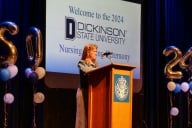You have /5 articles left.
Sign up for a free account or log in.
Elena Kagan, dean of Harvard Law School, lowered her spectacles and, as if addressing a group of students, presented her audience with a case study.
This one involved the University of Minnesota, where students had protested the hiring of a part-time Constitutional law instructor on the grounds that he was co-author of the controversial Department of Justice torture memo.
As dean, Kagan asked the audience, would you have hired the professor, Robert Delahunty? The answers were mixed.
Then Kagan changed the scenario. What if the professor was tenured at the time when the same facts came out? Would he be protected under the banner of academic freedom?
Yes, the audience of lawyers, law school professors and administrators almost unanimously agreed. Kagan understood the consensus.
“I would say, ‘Don’t bring in people whose views are antithetical to the core values of your institution,' ” Kagan said, prompting a listener in the back of the room to shout, “You’re on the right side!”
But Kagan wasn’t done with this dean-for-a-day lesson.
The audience's views on the two scenarios sent the message that “if [faculty] have tenure, we defend their full right,” she said. “Then we are saying that academic freedom belongs to people who have a certain contract status.”
That sentiment, she said, is increasingly problematic, given recent data from the American Association of University Professors showing a rise in faculty who are off the tenure track.
“In this changing world, where more than half of our faculty are visiting or part time, are we really sure that we can protect healthy inquiry?" Kagan asked.
It was just one of the pointed questions posed Thursday during a lively panel discussion on academic freedom at the Association of American Law Schools' annual meeting.
Panelists were quick to disagree with Kagan, who has been mentioned in the search for the Harvard presidency. Stanley Fish, a professor of humanities and law at Florida International University, took particular issue with the dean's comments about "institutions' core values" and with her admission that, in the Minnesota case, she would instruct staff members to select faculty candidates who wouldn't provoke student protests.
“Schools shouldn’t have values, except in a very narrow sense,” Fish said. [When asked later in the session to explain what type of values a law school should adopt, Kagan responded that there wasn't enough time to respond.]
Fish said law schools should avoid taking a political stance at all cost. He brought up Rumsfeld v. Forum for Academic and Institutional Rights , in which the Supreme Court upheld the Constitutionality of a law that allows the government to withhold federal funds from institutions that limit military recruiters’ access to campuses. The decision allows institutions to protest the recruiters' presence, but doing so would be inappropriate and “an exercise no different than coming out against the Iraq War," Fish said.
Geoffrey Stone, a professor at the University of Chicago Law School, added that the only valid protest from law schools is on the grounds that recruiters are "coming into their house, not as a proxy for giving a university's views on sexual orientation [implicit in the "Don't Ask, Don't Tell" policy.]
Another of Kagan's case studies involved an undergraduate English department that had invited and then uninvited a speaker after learning of a comment made that some perceived as anti-Semitic. Kagan said she understood the reaction, but Fish argued that once the invitation is made, the deal is done.
Stone introduced another scenario: that of an university making a blanket policy to hire or reject candidates based on a political affiliation. He said while universities should, in theory, strive to be ideologically blind in hiring, law school faculties are so dominated by supporters of the Democratic party that some type of affirmative action for right-leaning instructors might be needed.
Still, Stone called David Horowitz’s tack of approaching state legislators in an effort to regulate public institution hiring practices “abhorrent,” adding that colleges must take up the matter internally.
At the start of the panel, William W. Van Alstyne, a First Amendment scholar and law professor at the College of William and Mary, argued that academic freedom is under greater attack now than in decades past.
He pointed to a series of recent First Amendment cases that he called "discouraging," including Garcetti v. Ceballos, in which the Supreme Court ruled that a public employee's job-related speech, expressed in reference to official duties of employment, should not be given First Amendment protection. Even though the court largely avoided mentioning academe, Van Alstyne said it would probably have a cooling effect in the classroom and hurt academic freedom.
But is academic freedom worth protecting? Only when one applies a limited definition, Fish argued. Worthy of protection: a professor's ability to introduce material and equip students with analytical skills.
“That’s it,” he said. “There’s nothing else. The moment a professor tries to do something else [such as inject a political opinion], he is performing an action for which there should be no academic freedom."
Fish added that a professor who comes clean about her political view at the start of class still shouldn't be protected. "Ask this question," he said. "Is it an account or an advocacy of an agenda?








